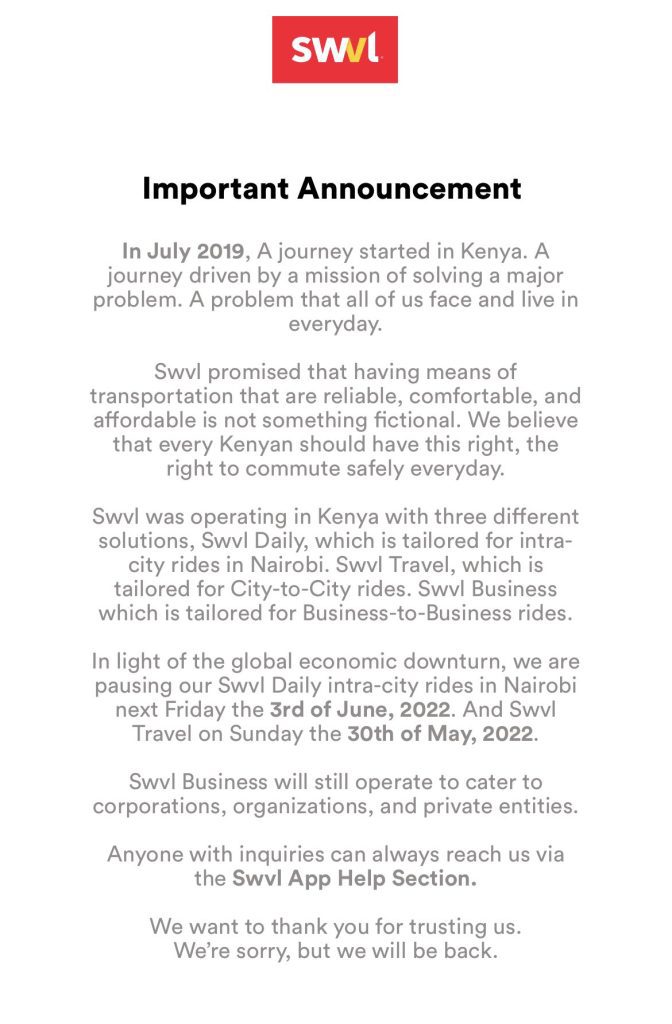Swvl’s Lastest Downsizing Effort Sees It Drop Kenya Amid Downturn

In a letter that was shared earlier this week, Mostafa Kandil, CEO of Egypt-born mobility startup, Swvl, made it known that the economic downturn, a pursuit of profitability, and other unforeseen circumstances have made it necessary for the company to reduce its workforce.
A reported 400 employees of Swvl – apparently a third of its workforce – are being laid off. Swvl has promised necessary assistance for the affected persons. Salary cuts, slashing of office, travel and accommodation expenses, and hiring freezes have also been implicated as part of the adjustments at the company. Now, the startup has gone a step further to batten down the hatches.
The downsizing effort appears to have also resulted in the rethinking of the startup’s operations in Kenya, where Swvl is scaling back.
Per a communication shared by the company late yesterday, Swvl Kenya has been put through a bit of housekeeping, presumably occasioned by the company’s desire to “implement a portfolio optimization program to focus on its highest profitability operations, enhance efficiency and reduce central costs,” as seen in the CEO’s letter.
Swvl has announced that it is pausing its Swvl Daily (intra-city) and Swvl Travel (city-to-city) rides in Kenya. The mass transit and shared mobility provider had been offering these services, including a third option tailored for businesses known as Swvl Business in the country, having been operating in Kenya since July 2019.

It is understood that Swvl Business will remain functional despite the indefinite suspension of Swvl Daily and Swvl Travel, underlining the startup’s intention to optimise for its more profitable undertakings.
Although its operations in Kenya have been blighted by trouble with local authorities at times, Swvl says it managed to establish a footprint that covered 300 routes to over 55 destinations which provide commuters with direct rides to the CBD, Upperhill and Westlands on Swvl Daily. An expanded route coverage eventually enabled Swvl to include Utawala to CBD, Joska to Westlands, Ongata Rongai to Westlands, and Kiserian to CBD and Westlands on its radar, per Tech Trends Kenya.
Swvl is understood to have secured partnerships with over 500 bus owners in the course of its operations in Kenya and the decision to scale back in the East African country is expected to affect around 100 jobs.
Founded in 2016 in Egypt and now headquartered in Dubai, Swvl is now present in 13 megacities across Africa, Asia, and the Middle East, offering a ride-sharing platform providing a semi-private alternative to public transportation. Its e-hailing platform enables cost-effective, organised, and convenient mass transit in several cities.
In the last two years, the startup has been particularly busy snapping up a number of acquisitions. Swvl’s CEO did mention in his letter that some of these acquisitions had helped accelerate growth and resulted in the automation of a number of processes previously manned by individuals, some of whom are unfortunately now being let go.
Swvl also completed a SPAC merger with U.S.-based women-led blank cheque company, Queen’s Gambit Growth Capital, just two months ago, despite a period of delays that created some uncertainty around the progress of the deal. Having gone public by virtue of the merger, Swvl is now valued at around USD 500-600 M, per TechCrunch.
The decision to downsize appears to be coming from a place of unease over the state of global markets, with the tech industry particularly taking a beating over the last few months. And Swvl seems to have made a strategic, albeit painful call to cut costs, navigate the downturn, and emerge from it in the best shape possible after months of expending significant resources in pursuit of multi-front growth.
Recession fears, rising interest rates, and underperformance of publicly-listed tech companies have injected pessimism into the global tech markets, forcing stock sell-offs that have triggered a market correction where tech company valuations have plummeted. Big Tech shed over USD 1 T in value over a three-day period last month. Many other companies have been hit hard, including Netflix, Peloton, Instacart, etc.
The bearishness in the public markets has affected investor activity and the general outlook in the private environment and an anticipated slowdown in venture capital funding is causing startups to take some weight off their spending; chiefly by resorting to layoffs. Hiring freezes are also happening, though to a lesser extent.
Notable job cuts have been reported at various companies, including Bolt (the checkout company), PayPal, Klarna, etc., and there were over 15,000 job losses in tech in May alone. Startups in the mobility sector particularly score high on the unfortunate scoreboard when it comes to layoffs, data from the tracking site, layoffs.fyi, suggest.
These trends are being felt across the globe, though it admittedly hasn’t been as pronounced in Africa’s emerging tech ecosystem. However, the evidence of Swvl’s recent adjustments does hit close to home as an indication that startups all over the world may have to adapt to the times one way or another, whether immediately or eventually.